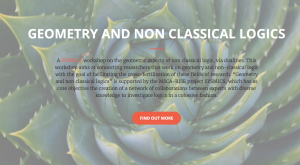PhD course on lattice-ordered groups and polyhedral geometry (Spring 2024)
Introduction
The course is an introduction to the theory of abelian lattice-ordered groups from different perspectives. Initially, we study these structures with purely algebraic methods. We will analyse some important theorems and connections with other parts of mathematics, such as AF C*-algebras. Later we will move on to their geometric study, through the Baker-Beynon duality. It will be seen that, just as the commutative rings provide an algebraic counterpart for the study of affine manifolds with polynomial maps, lattice-ordered groups represent the algebraic counterpart of the polyhedral cones and piece-wise linear homogenous maps between them.
Course topics
- Abelian lattice-ordered groups: definition and examples.
- Representation results.
- Archimedeanity and strong (order) unit.
- Free and finitely presented abelian l-groups.
- Baker&Beynon duality.
- Mundici’s functor.
- MV-algebras.
- Polyhedral geometry.
Lecture by lecture topics
- 19 March – Introduction to the course, overview of the contents, basic definitions and first properties. Lecture notes.
- 22 March – Examples, l-homomorphisms and l-ideals. Lecture notes.
- 26 March – Congruences and l-ideals. Prime l-ideals. Subdirect representation by linearly ordered l-groups. Lecture notes.
- 27 March – Lexicographic products, Archimedean l-groups, Hölder theorem, Weinberg theorem. Lecture notes.
- 4 April – General affine adjunctions. Example: Stone duality. Lecture notes.
- 5 April – Unital l-groups, MV-algebras, a geometric duality for semi-simple MV-algebras. Lecture notes.
- 9 April – Baker-Beynon duality Archimedean for l-groups. Lecture notes.
- 11 April – Beyond Baker-Beynon duality: the duality for the whole class of l-groups. Luca Carai’s Slides.
- 16 April – Polyhedral geometry: triangulations and unimodular triangulations. Lecture notes.
- 18 April – Finitely generated projective l-groups. Yosida duality. Lecture notes.
Course material
- Bigard, A., Keimel, K., & Wolfenstein, S. (2006). Groupes et anneaux réticulés (Vol. 608). Springer.
- Anderson, M. E., & Feil, T. H. (2012). Lattice-ordered groups: an introduction (Vol. 4). Springer Science & Business Media.
- Goodearl, K. R. (2010). Partially ordered abelian groups with interpolation (No. 20). American Mathematical Soc.
- Glass, A. M. W. (1999). Partially ordered groups (Vol. 7). World Scientific.
- Cignoli R., D’Ottaviano I. M. L., Mundici D. (2000) Algebraic Foundations of many-valued Reasoning, Trends in Logic, Vol. 7, Kluwer Academic Publishers.
- Mundici, D. (2011). Advanced Łukasiewicz calculus and MV-algebras, Trends in Logic, Vol. 35 Springer.
Practical aspects
Term and schedule
Lecturer: Luca Spada
Course duration: 20 hours.
Course calendar: Lectures will all take place in room P18 from 9:30 to 11:30 in the following days: 19 March, 22 March, 26 March, 27 March, 4 April, 5 April, 9 April, 11 April, 16 April, 18 April.
Exam
You can choose to take the final exam in one of the following ways:
- A short oral interview (about 30 minutes) in which the knowledge acquired on the basic and more advanced concepts will be evaluated.
- The presentation of a topic agreed with the teacher and not covered in the course, in the form of a short seminar also open to other doctoral students lasting about 30 minutes.
- Solving some exercises at home.
Are locally finite MV-algebras a variety?
Here you can find the slides of my talk Are locally finite MV-algebras a variety? presented at the Shanks Workshop on Ordered Algebras and Logic at Vanderbilt University (Nashville, US) and on Zoom for the Algebra|Coalgebra seminar of the ILLC (Amsterdam).
The material is based on a joint work with M. Abbadini (University of Salerno).
Unification in Lukasiewicz logic with a finite number of variables
In this paper, coauthored with Marco Abbadini and Federica Di Stefano, we prove that the unification type of Lukasiewicz logic with a finite number of variables is either infinitary or nullary. To achieve this result we use Ghilardi’s categorical characterisation of unification types in terms of projective objects, the categorical duality between finitely presented MV-algebras and rational polyhedra, and a homotopy-theoretic argument.
Workshop on “Geometry and non-classical logics”
 I am happy to announce that we will host a workshop on “Geometry and non-classical logics” at the campus of the University of Salerno, from the 5th to the 8th of September.
I am happy to announce that we will host a workshop on “Geometry and non-classical logics” at the campus of the University of Salerno, from the 5th to the 8th of September.
The workshop is one of the events planned within the EU-funded project SYSMICS.
Further information can be found at http://logica.dipmat.unisa.it/sysmics/geoNonLogic/
MV-algebras, infinite dimensional polyhedra, and natural dualities
Leo and I have just finished our paper on the connection between natural dualities and the duality between semisimple MV-algebras and compact Hausdorff spaces with definable maps. Actually, we provide a description of definable maps that is intrinsically geometric. In addition, we give some applications to semisimple tensor products, strongly semisimple and polyhedral MV-algebras.
The paper can be downloaded here.